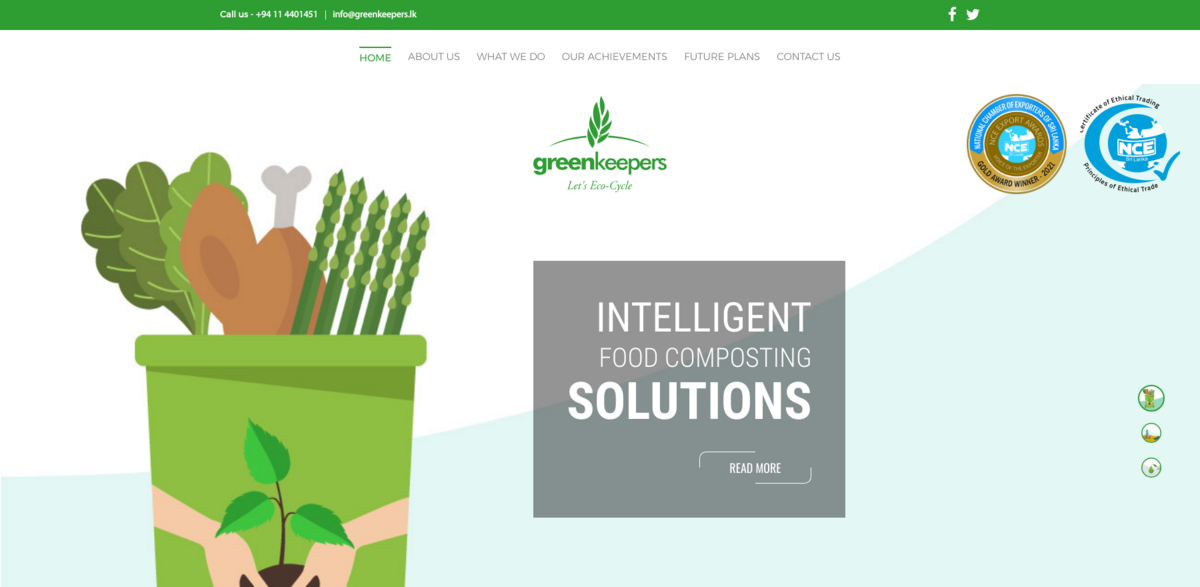What the Project Is About
This project revolves around intelligent food composting solutions and innovative waste management technologies designed to transform how Sri Lanka handles its waste. Using automated, odorless processes that harness microbes and heat, food waste is converted into nutrient-rich soil. Beyond food composting, the initiative includes setting up textile waste recycling mills to turn discarded fabrics into yarn and non-woven products. It also supports renewable energy development, focusing on solar power farms and compact wind turbines. Cutting-edge technology developed after 40 years of research enables the conversion of industrial and municipal waste into bio-fuel. Additionally, the project facilitates foreign investment to boost infrastructure and manages global surplus stock, exporting apparel, safety gloves, textiles, and yarns from Sri Lanka and beyond. Altogether, this comprehensive approach aims to promote circular economy principles and cleaner environments.
Main Benefits and Key Figures
Here are some standout benefits and facts about the project:
- Automated, odorless food composting turning waste into valuable soil nutrients.
- Textile waste recycling mills converting waste into reusable yarn and products.
- Development of solar and wind energy farms using state-of-the-art, compact turbines.
- Advanced bio-fuel technology from 40 years of research for industrial and municipal waste.
- Active foreign investment consultancy to secure infrastructure funding.
- Exporters of surplus stock including apparel and textiles from Sri Lanka and other origins.
- Ongoing awareness campaigns in schools, government, and private sectors promoting cleaner environments.
Achievements That Speak Volumes
The project’s impact is reflected in numerous prestigious awards and recognitions. For instance, Green Keepers (Pvt) Ltd bagged the Gold Award for Export Performance in 2021 at the National Chamber of Exporters event held at Shangri-La Hotel. Previous years saw similar accolades in 2019 and 2020, highlighting consistent export excellence. Internationally, the project won the Environmental Innovation Award in 2017 at the Sustainable Textile Symposium in Chemnitz, Germany. Other honors include the Environmental Catalyst Award from JASTECA in 2013, the Most Promising Entrepreneurship Award in 2012 for the Asia Pacific region, and National Green Awards in 2012, underscoring a strong commitment to environmental sustainability and entrepreneurship.
Future Plans and Vision
Looking ahead, the project has ambitious plans to tackle pressing environmental challenges. One key focus is preventing plastic and polythene pollution in Sri Lanka’s precious oceans, as the country ranks among the top five ocean polluters globally. There’s also a drive to create opportunities for entrepreneurs and unemployed individuals by establishing mechanisms to collect compost from OKLIN food waste composting machines. Energy conservation efforts include electrifying street lights with renewable energy, designed on a business model that avoids burdening the national grid. Additionally, a central fund is planned to build green houses for homeless communities, funded by revenue from the project’s various business streams. Educational outreach through lectures and seminars at schools and institutions aims to spread best practices and raise awareness about sustainable waste management.
Export and Recycling Focus
The project also emphasizes exporting industrial waste for compliant recycling and reusing QC rejected raw materials and finished products. It serves as an exporter of industrial waste specifically for recycling purposes, as well as rejected raw materials and excess inventory for reuse markets. International research and efforts are ongoing to introduce the most suitable, compliant, and state-of-the-art technologies to Sri Lanka. These technologies focus on recycling industrial waste and municipal solid waste (MSW) based on circular economy principles. This approach not only supports environmental sustainability but also fosters economic growth by tapping into reuse markets and reducing landfill dependency.
Project Impact on Sustainable Development Goals (SDGs)
- SDG 7: Affordable and Clean Energy – through renewable energy development.
- SDG 9: Industry, Innovation, and Infrastructure – via advanced recycling and bio-fuel technologies.
- SDG 11: Sustainable Cities and Communities – by promoting waste management and green housing.
- SDG 12: Responsible Consumption and Production – through circular economy practices.
- SDG 13: Climate Action – by reducing pollution and conserving energy.
- SDG 14: Life Below Water – targeting ocean plastic and polythene pollution.
- SDG 17: Partnerships for the Goals – through foreign investment facilitation and global networking.
Community Engagement and Awareness
Beyond technology and infrastructure, the project places strong emphasis on community engagement. It actively creates awareness in schools, government institutions, and the private sector about best practices for a cleaner environment. The team behind the project brings years of corporate experience combined with hands-on knowledge from working at dump yard levels. They have traveled extensively to share insights and educate various stakeholders. This grassroots approach ensures that sustainability is not just a concept but a practiced reality, fostering a culture of environmental responsibility across Sri Lanka.






















